Promoting the OECD Guidelines and providing guidance to businesses

Promoting the OECD Guidelines and providing guidance to businesses
One of the NCP’s most important tasks is to promote the OECD’s Guidelines for Multinational Enterprises as an effective tool for preventing adverse impacts. The Guidelines are more than just words. They are a practical tool that can prevent Norwegian businesses from making the wrong decisions in interactions with people, society and the environment.
Norway’s NCP carries out extensive information work and provides guidance to Norwegian businesses and other stakeholders on how they can meet the expectations in the OECD Guidelines, including through due diligence courses and sector-specific guidance.
With the introduction of the Transparency Act, Norway will have legislation that requires enterprises to carry out due diligence in line with the OECD Guidelines. This is both necessary and important.
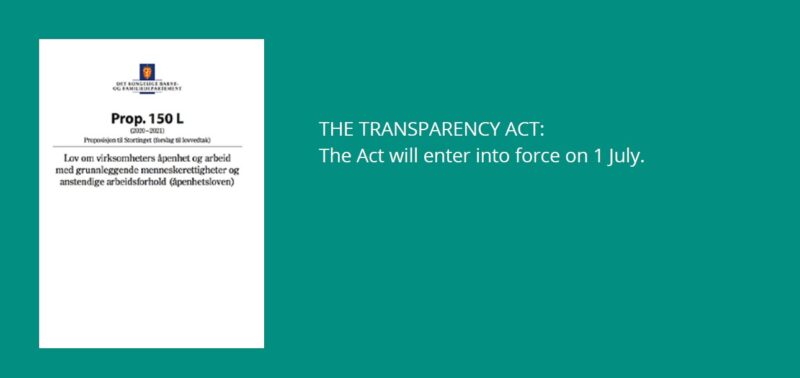
The Transparency Act was adopted by the Norwegian parliament, the Storting, in June 2021 and will enter into force on 1 July 2022. It will apply to larger enterprises that offer goods and services in Norway.
The objective of the Act is to promote respect for human rights and decent working conditions in connection with the production of goods and the provision of services. The Act shall also ensure access to information about how the enterprises address this responsibility.
Established principles
The Transparency Act is based on established principles and guidelines drawn up by the UN and the OECD. The UN Guiding Principles on Business and Human Rights were adopted in 2011. The OECD Guidelines were updated in line with these principles that year. The guidelines set out by the UN and the OECD set forth that enterprises shall follow up human rights in their own activities and through business relationships by means of due diligence.
Due diligence requirement
The Transparency Act requires enterprises to carry out due diligence. This means that they shall identify and assess the risk of causing, contributing to or being directly linked to adverse impacts on fundamental human rights and decent working conditions. Measures must be implemented and followed up. The enterprise shall communicate with its stakeholders and ensure or cooperate on remediation and compensation where required. The work must be embedded in the enterprise’s management and governance systems.
The due diligence requirement set out in the Act is closely aligned with the recommendations in the OECD Due Diligence Guidance for Responsible Business Conduct (2018). This is not a checklist, but rather a method and work that must be done continuously.
However, there are also some differences between the requirements set out in the Transparency Act and in the OECD Guidelines. The Transparency Act only applies to fundamental human rights and decent working conditions, while the OECD Guidelines also cover expectations of the enterprises with respect to the environment, anti-corruption, tax and other factors. The information duties set out in the Transparency Act are based on the duty to carry out due diligence. They are more detailed than the expectations on disclosure in the OECD Guidelines.
Too few follow the Guidelines
Part of the background for the introduction of binding legislation is that too few enterprises have followed the recommendations in the OECD Guidelines. The NCP conducted a survey of this in 2019, as discussed in the preparatory works to the Act. A majority of companies do not carry out due diligence with respect to human rights, particularly further down the supply chain. Other countries have similar experiences, and a number of states have therefore introduced new legal requirements. The EU has presented a proposal for a directive on corporate sustainability due diligence, in addition to the sustainable finance taxonomy and the proposal for new reporting requirements on corporate sustainability.
The Transparency Act will apply to large and medium-sized enterprises and thereby sets a lower threshold than the corresponding regulations in other countries. This may become a competitive advantage for Norwegian enterprises. The Transparency Act makes it clear that due diligence should be risk-based and proportionate. The key to success lies in recognising the opportunities that come with securing a good foundation for and follow-up of efforts with respect to human rights and decent working conditions within the enterprise and in relation to business partners and supply chains.
Game changer
There is no doubt that the Transparency Act is a game changer iwith respect to efforts to realise responsible business conduct. There has been a great deal of interest in the OECD Guidelines and the development of legislation in this area. The NCP and the secretariat have given talks at a number of events for specific industries, financial institutions, law firms and academia in 2021. We contribute where we can to spread knowledge and provide guidance on the OECD Guidelines and due diligence.
The Consumer Authority is tasked with providing guidance and supervising the Transparency Act. Good cooperation is under way when it comes to contributing to a good understanding of what due diligence in line with the OECD Guidelines entails.
Part of the background for the introduction of binding legislation is that too few enterprises have followed the recommendations in the OECD Guidelines.Kristel Tonstad, Policy Director, NCP
In which areas have the businesses that carry out due diligence mapped risk?
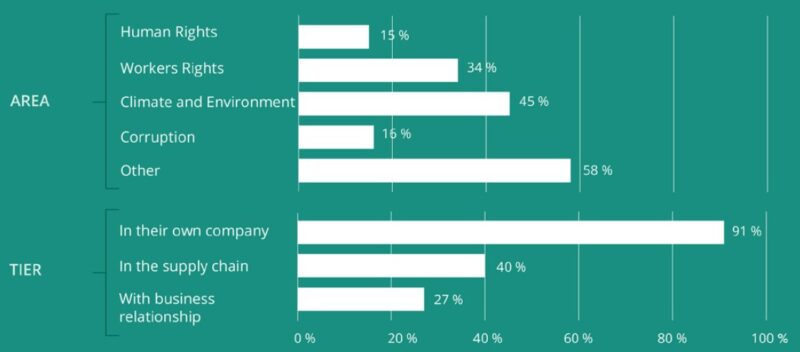
39 %
of companies with activities abroad want more guidance on responsible business conduct
50 %
have adopted written guidelines on responsible business conduct/sustainability. Only
12% of these refer to the OECD Guidelines
50 %
perform some form of due diligence, but only 40% of these in relation to the supply chain
28 %
have indicators (KPIs) for responsible business conduct
The EU Sustainable Finance Taxonomy has received a great deal of attention in the financial industry and business sector in the past year. It provides a classification system for what is required for an economic activity to be classified as sustainable. The activity must make a significant contribution to at least one of the EU’s six environmental objectives. It must not harm the other objectives and it must also meet minimum social safeguards. These safeguards refer to, among other things, the OECD Guidelines for Multinational Enterprises. Together with the EU’s Sustainable Finance Disclosure Regulation, the framework is being implemented in Norwegian legislation through the Sustainable Finance Act (Lov om offentliggjøring av bærekraftsinformasjon i finanssektoren og et rammeverk for bærekraftige investeringer – in Norwegian only).
In 2021, the EU presented a proposal for a new Corporate Sustainability Reporting Directive. The proposed directive is to replace the Non-Financial Reporting Directive, which was incorporated in Section 3-3 C of the Norwegian Accounting Act in 2021. Section 3-3 C of the Accounting Act requires large undertakings to prepare a statement on corporate social responsibility.
There is a lot of interest among businesses, and they are calling for more information about the minimum safeguards in the EU taxonomy. The NCP’s expertise is valuable in this context
 Cathrine Dehli
Cathrine Dehli
member of the NCP and
Head of Product and Sustainability in Celsia

What will the Transparency Act mean for businesses? How can businesses prevent the due diligence requirement becoming a costly bureaucratic exercise that does not generate results for the people concerned?
This was the topic of a panel debate during the Arendalsuka event in August 2021. The panel debate was a collaboration between Norway’s National Contact Point for Responsible Business Conduct, the Norwegian Bar Association and the Rafto Foundation for Human Rights.
‘The Transparency Act is a very important act of law. In practice, it is a human rights act for businesses, because it requires them to be more transparent and to perform due diligence,’ said Frode Elgesem during his introduction to the panel debate.
‘Getting information and guidance out to businesses on how to comply with the act will be important now. It will apply to between 8,000 and 9,000 Norwegian enterprises. Many of them are doing good work, but there are also many that do not have a good enough understanding of what it entails,’ Elgesem pointed out.


Kristel Tonstad took up the position in February 2021. Professional and efficient handling of complaints is one of the NCP’s most important tasks. Having a leading professional resource person dedicated to handling complaints on behalf of the NCP is therefore very valuable.
The expectations and requirements of responsible business conduct are undergoing rapid development both in Norway and across the world. The OECD Guidelines and due diligence expectations form the basis for numerous sustainability regulations, both nationally and internationally. In 2021, Tonstad has given talks at many high-profile events and helped to consolidate the NCP’s reputation as an expert body.

‘If Norwegian businesses are to succeed in international markets, they must lead the way when it comes to responsible business conduct’
said Chair of the NCP, Frode Elgesem, when he opened the dialogue meeting
on 26 April 2021.
In connection with the launch of its annual report, the NCP invites stakeholders from the business sector, employer and employee organisations and civil society to an annual dialogue meeting. Two panel debates provided important input on relevant topics.
‘The annual dialogue meeting is important to the NCP, because it provides input and critical feedback from our most important stakeholders. It has direct implications for how we work and what we work on,’ says Elgesem.

The background for the panel debate on due diligence during the dialogue meeting was expectations of responsible business conduct in our economic recovery from the coronavirus pandemic, the new Transparency Act and the NCP’s survey of businesses.
 Are Tomasgard, Confederal Secretary, Confederation of Trade Unions (LO)
Are Tomasgard, Confederal Secretary, Confederation of Trade Unions (LO)
‘Only 30% have heard of the Guidelines, 7% have familiarised themselves with them and a mere 2% say they are very familiar with them. That is shocking to us. It means we have our work cut out.’
 Gjermund Løyning, Director of Politics and Public Affairs, NHO
Gjermund Løyning, Director of Politics and Public Affairs, NHO
‘The Confederation of Norwegian Enterprise (NHO) requires Norwegian enterprises to know how to conduct themselves when they set up business in demanding markets. The OECD Guidelines are important for raising awareness of responsible business conduct. The NCP does an important job of guidance and running courses in responsible business conduct for NHO’s members.’
 Diego Foss, Policy Advisor, the Norwegian Forum for Development and Environment
Diego Foss, Policy Advisor, the Norwegian Forum for Development and Environment
‘Some of our members are probably not aware of the NCP or the grievance mechanism. It is our joint responsibility to raise the profile of the NCP and, not least, to ensure that the grievance mechanism is perceived as relevant to Norwegian organisations.’
 Monica Sander, Managing Director, Beer Sten
Monica Sander, Managing Director, Beer Sten
‘Being small is no excuse. We can do as good a job as anyone else when it comes to due diligence.’
Photos: Torbjørn Helin

The EU’s Sustainable Finance Taxonomy was the topic of the second panel debate during the dialogue meeting. Experts discussed and reflected on the significance of the taxonomy, in dialogue with the NCP’s new Policy Director.
The taxonomy defines which economic activities are sustainable. A sustainable economic activity must not only meet one the EU’s environmental and climate-related objectives; it must also not do significant harm to the other objectives. Sustainable economic activities must also meet minimum social safeguards in line with, among other things, the OECD Guidelines for Multinational Enterprises. The participants in the panel discussed the social dimension of sustainable finance against this background.

‘The opposite of diligent is negligent, and we don’t like that in finance. A just transition and ”inclusive green growth” are more than mere oratory. They are fundamental preconditions for achieving the transition needed to reduce climate risk.’

‘Climate change has consequences for people, their lives, health and welfare, and is the very core of what human rights seek to protect.’

‘An enterprise that works in renewables may be seen as a green industry, but if it operates in conflict-affected areas, it may be linked to human rights violations. These issues are connected, and both risks have to be measured.’

‘The more knowledgeable the customer is about risk in their industry, the lower that risk is for us as a bank. It means that they actually address risk and make efforts to reduce it.’
Photos: Torbjørn Helin
Outward looking business

The NCP is the official expert body for promoting and interpreting the OECD Guidelines, and the new Transparency Act has led to increased demand for courses and guidance on responsible business conduct.
Following a year’s break during the coronavirus pandemic, the NCP again ran a course in autumn 2021 on responsible business conduct and due diligence. The course was quickly fully subscribed and there is a waiting list for the next course. More than 30 participants from 20 enterprises in different sectors took the course in 2021.
The course NCP runs is unique in both its content and scope. It comprises three full-day seminars over the course of a few months. Apart from the actual course content, the participants have said that they get a lot out of discussions and exchanging experience with the other participants in the course. The participants are also offered three hours of free guidance on top of the sessions, from Ethical Trade Norway.
During the course, the participants gain an understanding of what responsible business conduct is and how it can be implemented in practice. They are given an introduction to international standards, such as the OECD Guidelines for Multinational Enterprises and the UN Guiding Principles on Business and Human Rights, and the Government’s expectations of responsible business conduct, the new Transparency Act and general developments in the field.
To flesh out the theory, the programme always includes representatives from a range of different enterprises. They explain how they work on due diligence in practice, the challenges they face and how they addressthem.
The participants are also expected to work individually on using the NCP’s tool, the RBC Compass. The participants are expected, in consultation with the instructors, to prepare a presentation for the board or management of their own company, and draw up a plan for developing or further developing systems and procedures for risk and due diligence in their organisation.




‘Ruter was lucky to get a place on the NCP course on responsible business conduct and due diligence. Few organisations know more about the topic than the NCP, and we’ve also learnt a lot from the interesting talks given by representatives of businesses, organisations and the authorities. The guidance provided during the process was very valuable and useful.’
[dss-hidden]

‘The course in responsible business conduct has taught us a lot about the OECD Guidelines and particularly about how we can work on due diligence. We have also established a good network and received excellent guidance during the process. We will incorporate what we have learnt into our sustainability work. I strongly recommend this course!’
[dss-hidden]

‘The course combines learning about the OECD Guidelines with insight into how other enterprises work on implementing them. All the presentations, group assignments and discussions in and outside the course provide a unique opportunity to benchmark where KONGSBERG stands and to help us to define our next steps forward.’
Many actors would like to know more about responsible business conduct and due diligence. This has led to a busy year for the NCP.
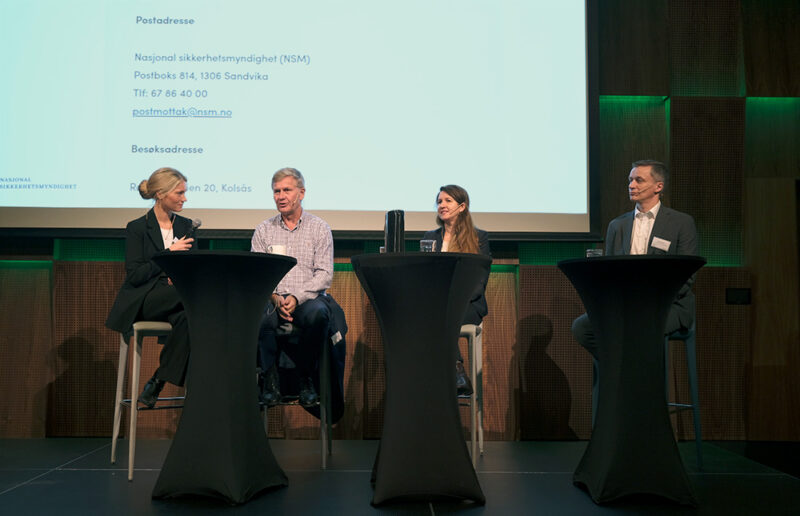
Photo, from the left:
Lawyer Helen Bogen from Wiersholm; Erik Solheim, President of the Green Belt and Road Institute; Policy Director Kristel Tonstad from the NCP; and Dag Sandham, Head of Section at the Norwegian National Security Authority.
The Transparency Act has led businesses and other organisations to seek more knowledge. The EU Taxonomy for sustainable activities with minimum social safeguards, based on the OECD Guidelines, has also led many to seek the NCP’s expertise.
In 2021, the NCP and the secretariat have given talks at more than 35 high-profile conferences and events for the business sector, ministries, civil society, and to lawyers and the financial industry. This includes a talk at a large conference on the Transparency Act organised by several ministries, where Minister of Trade and Industry Jan Christian Vestre and Minister of Children and Families Kjersti Toppe also gave talks. Policy Director Kristel Tonstad has been a popular speaker. The topics she has spoken on include the OECD Guidelines, experience from specific instances and relevant regulatory developments.
The NCP has cooperated with the Confederation of Norwegian Enterprise (NHO), the Confederation of Norwegian Trade Unions (LO) and Ethical Trade Norway on the course ‘Trading with China in a demanding age’, contributed to the training of embassy staff and foreign service trainees in the Ministry of Foreign Affairs, given a talk at the Nobel Peace Centre’s seminar series Real Business, Bergen Chamber of Commerce and the Rafto Foundation’s Future-Proof platform for business and human rights, the Globalisation Conference and a range of other seminars organised by various actors.
.
The NCP’s work is attracting increasing attention.
The new Transparency Act
All media coverage of the Transparency Act has made reference to it being based on the OECD Guidelines, and many have mentioned the NCP’s advisory role.
In an interview with the newspaper Vårt Land in September 2021, acting Minister of Children and Families Olaug Bollestad, responsible for the Transparency Act, said that supervising 9,000 enterprises would be a significant task for the Consumer Authority. She referred to the strong expert communities in place that can assist the Consumer Authority, such as the NCP.
Telenor’s withdrawal from Myanmar
In 2021, Telenor’s withdrawal from Myanmar attracted a great deal of media attention. It also led to the Centre for Research on Multinational Corporations (SOMO) submitting a complaint to the NCP against Telenor on behalf of 474 organisations. They claim that Telenor has failed to observe the OECD Guidelines for Multinational Enterprises with respect to risk-based due diligence, stakeholder dialogue and disclosure in connection with Telenor’s sale of its business in the country. The complaint is in process.
Chair of the NCP, Frode Elgesem, was interviewed in September on the news programme NRK Dagsrevyen about the case, and he participated on the radio programme Dagsnytt 18 in October, together with the parties to the case.
The NCP cannot comment on specific instances in process, and has procedures in place for avoiding comment until the cases are concluded. Elgesem therefore participated to discuss the NCP’s handling of complaints in general, and not the specific instance concerning Telenor specifically.
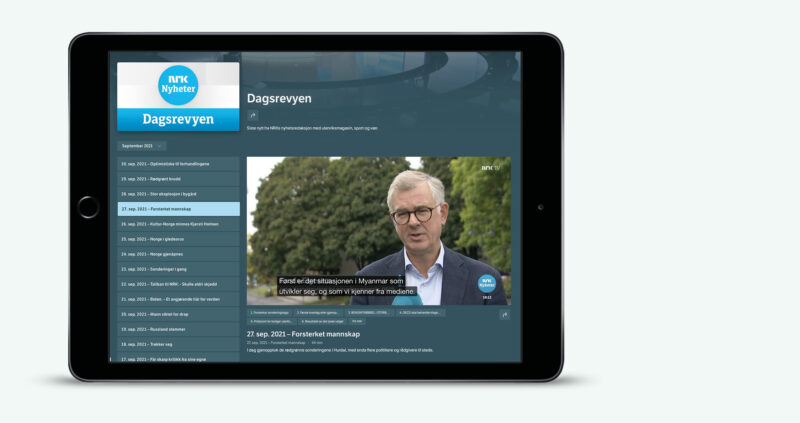
Tools
It can be demanding for companies to familiarise themselves with the recommendations in the OECD Guidelines. The OECD has therefore devised sectoral guidance documents containing specific and practical advice adapted to different sectors.
The guidance has been developed in cooperation with key industry actors and represents specific recommendations from the governments of OECD countries. This makes them unique.
The guidance documents focus on stakeholder dialogue and include a special gender perspective. The NCP promotes the guidance documents through seminars and courses.
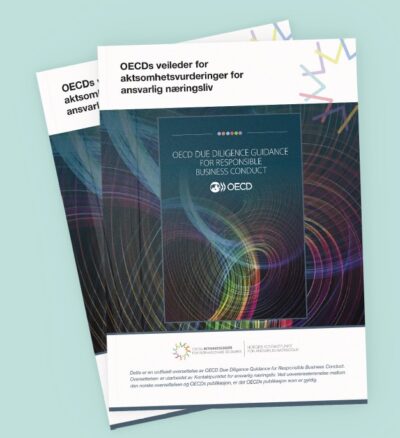
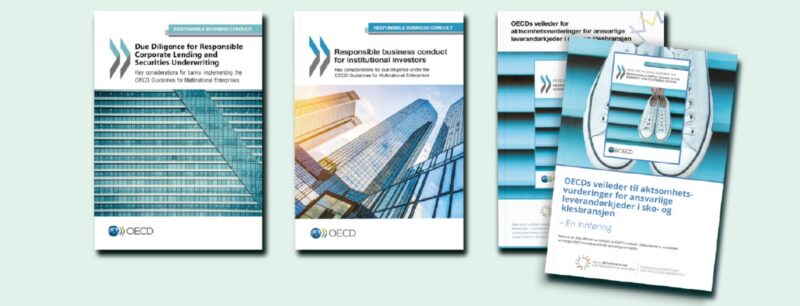
Responsible business conduct for institutional investors
OECD Due Diligence Guidance for Responsible Supply Chains in the Garment and Footwear Sector
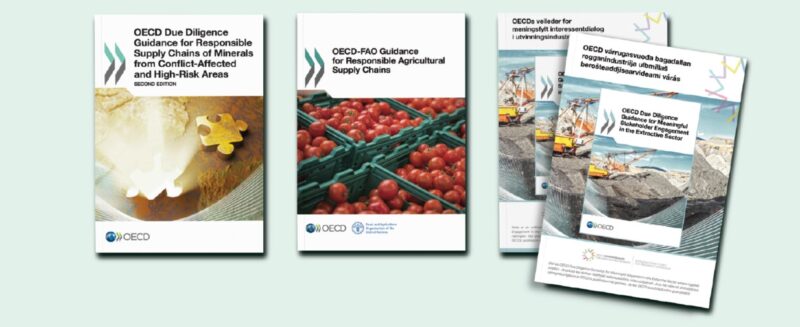
OECD-FAO Guidance for Responsible Agricultural Supply Chains
OECD Due Diligence Guidance for Meaningful Stakeholder Engagement in the Extractive Sector
